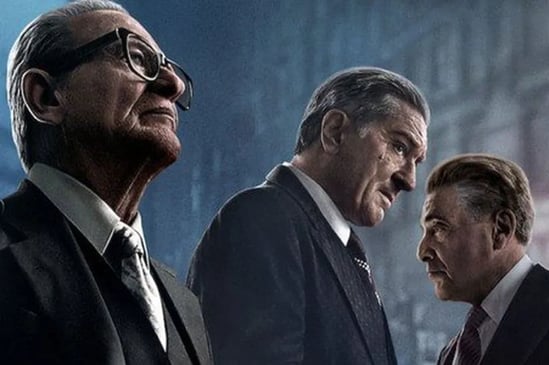The Irishman: Echoes of Loyalty, Betrayal, and Time's Unforgiving Toll
Cinemapedia
Martin Scorsese’s The Irishman is a sprawling epic that weaves together themes of loyalty, betrayal, and the inexorable passage of time. With a star-studded cast, including Robert De Niro, Al Pacino, and Joe Pesci, the film transcends the traditional boundaries of the gangster genre to deliver a deeply reflective meditation on the cost of a life lived in shadows.
A Confession of a Lifetime
The narrative follows Frank Sheeran (Robert De Niro), a World War II veteran turned mob hitman, as he recounts his life story from a nursing home in his twilight years. Through a series of flashbacks, the film explores his rise in the criminal underworld, his complex relationship with union leader Jimmy Hoffa (Al Pacino), and the moral compromises that ultimately lead to his isolation.
Scorsese’s storytelling is deliberate and meticulous, allowing the weight of Frank’s choices to settle with the audience. The film’s three-and-a-half-hour runtime provides ample space to delve into the intricacies of loyalty and betrayal, building to a poignant and haunting conclusion. The dialogue crackles with authenticity, capturing the era’s atmosphere while laying bare the characters’ vulnerabilities.
A Cinematic Time Capsule
The Irishman is a visual triumph, seamlessly blending the past and present through groundbreaking de-aging technology. De Niro, Pacino, and Pesci are convincingly transformed into younger versions of themselves, allowing the film to span decades without breaking immersion.
Rodrigo Prieto’s cinematography captures the grit and glamour of mid-20th-century America. The muted color palette and period-accurate details enhance the film’s somber tone, while Scorsese’s trademark tracking shots and deliberate pacing imbue the story with a sense of inevitability.
Nostalgia and Melancholy
The soundtrack is a carefully curated collection of classic songs that evoke the film’s era and mood. Tracks like “In the Still of the Night” and “The Theme from The Irishman” punctuate key moments, adding emotional depth to the narrative.
The sound design is equally impressive, with the subtle hum of background noise and the sharp crack of gunfire adding a visceral edge to the story. Silence, too, is used to devastating effect, particularly in the film’s reflective final act.
The Weight of Choices
At its core, The Irishman is a meditation on the cost of a life built on violence and betrayal. Frank’s journey is one of gradual isolation, as his loyalty to the mob and Hoffa comes at the expense of his family and humanity.
The film explores the futility of power and the inevitability of time’s passage. In the end, Frank’s achievements and sacrifices amount to little more than a solitary existence, underscoring the emptiness of a life lived without genuine connection or redemption.
A Masterpiece of Reflection
The Irishman is a masterwork that cements Scorsese’s legacy as a filmmaker capable of both grandeur and introspection. It is a film that demands patience and rewards contemplation, offering a sobering look at the human condition through the lens of crime and loyalty.
For fans of Scorsese’s previous work, this film serves as a fitting capstone to his exploration of the gangster genre. For newcomers, it is an invitation to experience a story that lingers long after the credits roll. In the end, The Irishman is more than a tale of crime; it is a requiem for the choices that define us and the time that slips away.


